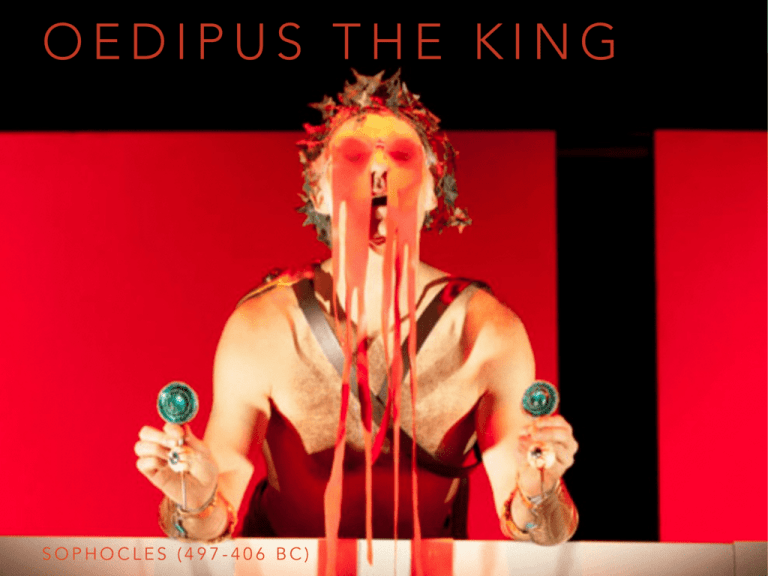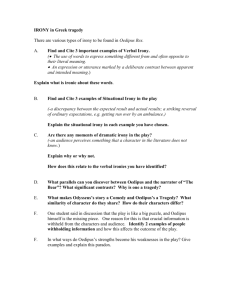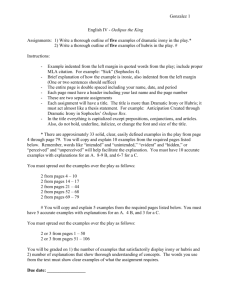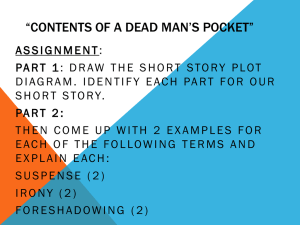Oedipus 1
advertisement

OEDIPUS THE KING SOPHOCLES (497-406 BC) ANNOUNCEMENTS • I am gone Oct. 3-10 • I’ve re-arranged the next 4 weeks to suit: check Schedule • next week: Sappho, Catullus, Ovid • no class on 10/7 • Hildegard of Bingen? • PDFs of first 4 PowerPoints now available on “Schedule” page G R E E K T H E AT E R • emerges from religious rites surrounding Dionysius (pre-500); tragedy and catharsis • subjects diverge (400s) from religious ones: tragedies, comedies, “satyr” plays • competitive: Sophocles always wins or comes in second • initially a single actor and the chorus (the people) • Aeschylus (520-455) adds a second actor, Sophocles a third G R E E K T H E AT E R • masks worn in order to help the actor become the role • although Dionysius largely a female cult, female role performed by men • women may have been present in audience; regardless, many important female roles (Jocasta, Antigone) • 12-50 members of chorus (15 in Sophocles); possibly sung G R E E K T H E AT E R • amphitheaters were large (could seat up to 14,000) • orchestra contained the chorus • backdrop called skênê (scene), space in front called proskenion (proscenium) • parados (entry) and exodos (exit); mechane (crane for flying); deus ex machina • Thespis (6th c BC) first actor, i.e., first thespian SOPHOCLES • ca. 497– ca. 406 BC (over 90 at the time of his death) • wealthy family, highly educated • the greatest dramatist of antiquity; almost all of his plays are lost (we have 7 of 123) • Oedipus at Colonus was written in the year of his death, one of three “Theban plays” • advanced complexity of character, irony IRONY • irony: enormous confusion surrounding one of the few tropes (figures of speech) that we use and talk about every day • “wow. ironic.” • but English teachers tell us that irony is when you say the literal opposite of what you mean! • But: the definition of “literally” in the dictionary has been changed to include the meaning “metaphorically, not literally” • isn’t that ironic? IRONY • Socratic irony: “I’m so glad you know what virtue is, Meno—I don’t know what it is at all! Tell me!” • verbal irony: “Smooth move, Romeo” • dramatic irony: “Find the killer of Laius!” • cosmic irony: I moved to a foreign land so I couldn’t fulfill the prophecy—and hence fulfilled the prophecy irony: a condition of affairs or events of a character opposite to what was, or might naturally be, expected; a contradictory outcome of events as if in mockery of the promise and fitness of things. —The Oxford English Dictionary MIND THE GAP verbal literal meaning Socratic dramatic cosmic appearance performer’s knowledge expectation MIND THE GAP actual meaning reality audience’s knowledge reality IRONY • dramatic irony and psychology • others understand the true meaning of our words—we do not • I perform myself at all times —but for which audience • the “other stage” (andere Schauplatz) • the “primal scene” • Oedipus the King is the text of dramatic irony “I forbid that man, whoever he be, my land, my land where I hold sovereignty and throne; and I forbid any to welcome him… or give him water for his hands to wash. I command all to drive him from their homes, since he is our pollution…. Upon the murderer I invoke this curse— whether he is one man and all unknown, or one of many—may he wear out his life in misery to miserable doom!.” –OEDIPUS THE KING “Listen to me and learn that human beings have no part in the craft of prophecy. Of that I’ll show you a short proof. There was an oracle that told Laius that it was fate that he should die a victim at the hands of his own son. But, see now, he, the king, was killed by foreign highway robbers at a place where three roads meet… and for the son—before three days were out after his birth King Laius pierced his ankles and by the hands of others cast him forth upon a pathless hillside.” –OEDIPUS THE KING “So Apollo failed to fulfill his oracle to the son, that he should kill his father, and to Laius also proved false in that the thing he feared, death at his son’s hands, never came to pass. So clear in this case were the oracles, so clear and false.” –OEDIPUS THE KING THE SPHINX • knowledge and self-knowledge (blindness and insight) • the riddle of the Sphinx • the answer of Oedipus • is his answer correct? how might it be wrong? • he answers in the universal (“man”) rather than in the particular, missing what is individual about him, how he, Oedipus, walks • written in his name Moreau Fabre Moreau Ingres THE SPHINX • knowledge and self-knowledge (blindness and insight) • the riddle of the Sphinx • the answer of Oedipus • is his answer correct? how might it be wrong? • he answers in the universal (“man”) rather than in the particular, missing what is individual about him, how he, Oedipus, walks • written in his name O E D I P U S A N D P L AT O • knowledge and self-knowledge (blindness and insight) • what happens when you move into the blinding light of truth? Surely no one would ever prefer to return to the dark afterwards! • Oedipus the King is a cosmic ironizing of the Allegory of the Cave: you wanted to go into the light? Attain insight? At what cost? What if it reveals a “mockery of the promise and fitness of things”?









